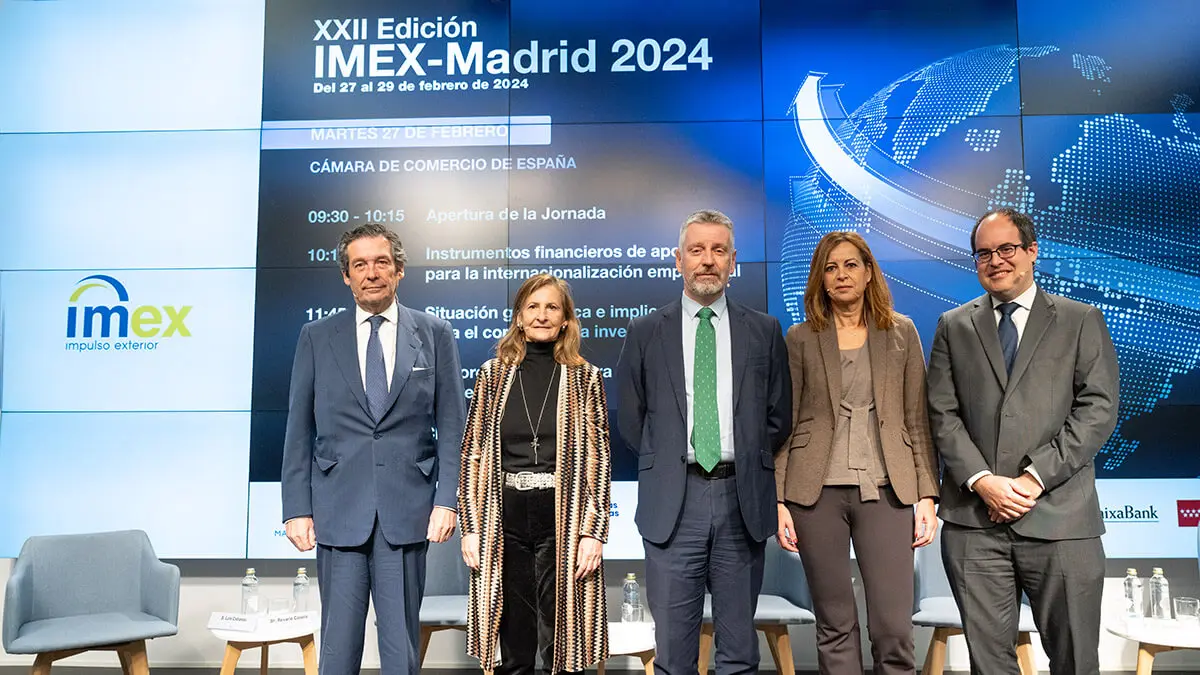Financing, geopolitics and future sectors for internationalisation, to be debated in the first session of IMEX Madrid

The first round table of the inaugural session of IMEX Madrid was moderated by José Terreros, director of the Fair, and addressed the analysis of the various financial instruments to support business internationalisation.
- Cesce
- Official Credit Institute
- Cofides
- Secretary of State for Trade
- CaixaBank
- Geopolitics and sectors of the future
Cesce
Cesce's president, Fernando Salazar, spoke on behalf of Cesce, who clarified that this organisation does not offer financing, but that its mission is to ensure credit to companies: "we make sure that businessmen are paid for their exports. We have various insurance products for the foreign trade financier, such as the Documentary Letter of Credit, which is our main tool".

Salazar explained that they have agreements with up to 138 international banks, which offer credit lines, as well as guarantees for SMEs or buyer credit policies. "We have also recently launched policies for strategic investments in new sectors of the national economy," he said.
Official Credit Institute
The Instituto de Crédito Oficial (ICO) was represented by its Director General for Business, Rosario Casero, who pointed out that support for the internationalisation of Spanish companies is key to improving their competitiveness and productivity and increasing job creation. "We have invested 15,000 million euros to support companies, in a total of 11,000 operations, mostly with SMEs," she said.

Casero placed special emphasis on two concepts that he considers fundamental in the internationalisation process of Spanish companies. "On the one hand, recent crises such as the Covid crisis or the war in Ukraine have highlighted the need to diversify both the sources of financing, as well as the financiers and the products that are exported. This is very important, because when the situation worsens, markets close," she warned.
The second concept is de-globalisation: "more and more, countries are protecting their industries, supporting not only the promoter, but the whole value chain of that industry", she explained.
The director of the ICO concluded her speech by pointing out the challenge of channelling European funds towards companies: "we have to 'land' 40,000 million euros in loans for Spanish companies".
Cofides
Ana Cebrián, Deputy Director of the Internationalisation Department of Cofides, a public-private company that manages funds on behalf of the State and the European Union to support foreign investment projects of Spanish companies, pointed out that "we have supported more than 1,000 projects in 90 countries, with an investment of 4,000 million euros. We provide additionality to the instruments available on the market, adapting to the needs of the companies, from 75,000 to 4 million euros.

Cebrián also highlighted the presence of Cofides in Latin America and, after the pandemic, in a number of countries that present less risk.
Secretary of State for Trade
Jordi Fornells, Head of Financial Promotion of Internationalisation at the Secretary of State for Trade, referred to the instruments that the Ministry places at the service of companies, complementing those available on the market, and stressed that "internal coordination between all the instruments available to companies is vital: we are at the service of companies, with the aim of providing them with equal opportunities compared to their foreign competitors".

Fornells also pointed out that the other main aim of the Secretary of State for Trade is to tackle market failures, with official support instruments, complementary to private supply and assuming greater risk than the private sector.
CaixaBank
The last speaker at the table was Luis Cabanas, Director of Corporate Banking at CaixaBank, who recalled that "we have been serving society for more than 100 years, and since 1998 we have focused on corporate banking, with our own network of more than 230 centres, which constitute a model of proximity to our customers".
As Cabanas pointed out, CaixaBank is the leading financier of companies in this country: "half of them work with us, and we offer them all kinds of products, from pre-financing to post-financing, with a network that serves more than 130 countries. Therefore, we are necessary collaborators of all the institutions present here and we are prepared to attend to any need of Spanish companies".

Geopolitics and sectors of the future
The day continued with the round table dedicated to the "Geopolitical situation and implications for international trade and investment", moderated by the journalist José María Triper, with the participation of Alicia Varela, Director General of International Trade and Investment of the Ministry of Economy; Ana Esmeralda Martínez, Director General of Economic Diplomacy of the Ministry of Foreign Affairs; Ricardo Santamaría, Director of Country Risk and Debt Management of Cesce; and Judith Arnal, of the Elcano Royal Institute.
Afterwards, some success stories were reviewed at the round table dedicated to "Sectors of the future for business internationalisation", moderated by Jaime Montalvo, Director of International Affairs at the Chamber of Commerce.
Luis Rodríguez-Ovejero, President of SATEC; Eduardo Mesegué, Director of Legal and Institutional Affairs of GB Foods; José Eugenio Salarich, Director of International Relations of Acciona; and Jon Fernández, Corporate Director of Orbea took part in the round table.
The conference was closed by Inmaculada Riera, Director General of the Spanish Chamber of Commerce.








